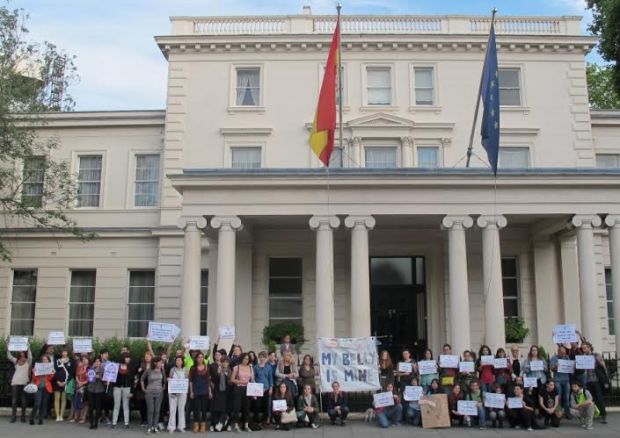Feministas británicas, españolas e irlandesas de los colectivos pro-elección My Belly is Mine, Asamblea de mujeres y Speaking of I.M.E.L.D.A., llevaron a cabo una acción de protesta el 2 de agosto en el centro de Londres, para dar a conocer el proyecto de ley anti-aborto en España, conocido como ‘ley de Gallardón’. El proyecto de ley será pronto presentado en el Congreso español. La acción también supuso la presentación oficial del nuevo grupo Spanish Women’s Abortion Support Group (SWASG 2.0), que tiene como objetivo proporcionar apoyo en la práctica a las mujeres que viajen desde el Estado Español a Londres para interrumpir su embarazo si el proyecto de ley pasase. Este grupo de apoyo es el Nodo Londres de la Red Internacional Federica Montseny, iniciativa desarrollada por las feministas españolas en Berlín.
Grupos de apoyo al aborto en Londres en los años 80
Ésta no es la primera vez que un grupo de apoyo como SWASG 2.0 ha existido en Londres. Abortion Support Network actualmente ayuda a miles de mujeres al año procedentes de Irlanda a practicarse abortos en el Reino Unido. El aborto nunca ha sido despenalizado en la República de Irlanda, mientras que en España, el acceso al aborto está disponible desde 2010 y ahora se encuentra bajo amenaza por el proyecto de ley contra el aborto. A principios de los años 80, Ann Rossiter e Isabel Ros López, activistas irlandesa y española, ayudaron a establecer en la capital británica el Irish Women’s Abortion Support Group (IWASG) y el Spanish Women’s Abortion Support Group (SWASG) respectivamente. En 1982, 21.000 mujeres vinieron de España a tener abortos en Inglaterra, y más de 8.000 mujeres de Irlanda -de las que 6.000 procedían de la República y 2.000 de Irlanda del Norte.
Las actuales defensoras pro-elección tienen ahora la oportunidad de escuchar a Ann e Isabel explicar el por qué y cómo se configuraron los grupos de apoyo al aborto irlandés y español. En esta película, La historia se repite, producida por My Belly is Mine, Speaking of I.M.E.L.D.A. y la London Irish Feminist Network (LIFN), entrevistamos a Ann e Isabel en La Biblioteca Feminista (Londres). Ann recuerda:
“Con todas estas mujeres llegando … nos preguntábamos qué demonios podríamos hacer. Y es importante decir que esto era a muy pequeña escala. Según los estándares de hoy en día, las cosas eran bastante primitivas.”
Ann e Isabel comparten sus experiencias como voluntarias en ambos grupos de apoyo: describen la organización y el día a día de estas actividades de apoyo, cómo se las arreglaron para obtener acuerdos especiales para las mujeres en las clínicas y recaudar fondos y describen el espíritu de cooperación internacional de las activistas pro-elección en aquel momento. Ann también pone la alerta sobre las decisiones difíciles y los costos financieros que las mujeres españolas tendrán que soportar si se aprueba la ley antiaborto de Gallardón.
La historia se repite: una nueva ola de activismo pro-elección irlandés y español en Londres
Ann e Isabel a menudo colaboran con Speaking of I.M.E.L.D.A. y My Belly is Mine en las acciones pro-elección. Isabel también asesora a SWASG 2.0. De hecho, el nombre de SWASG 2.0 fue elegido como un homenaje a la labor de Isabel y sus colegas. No sólo se forjan conexiones nacionales en esta actual ola de activismo pro-elección irlandés y español en la capital británica, sino también intergeneracionales.













